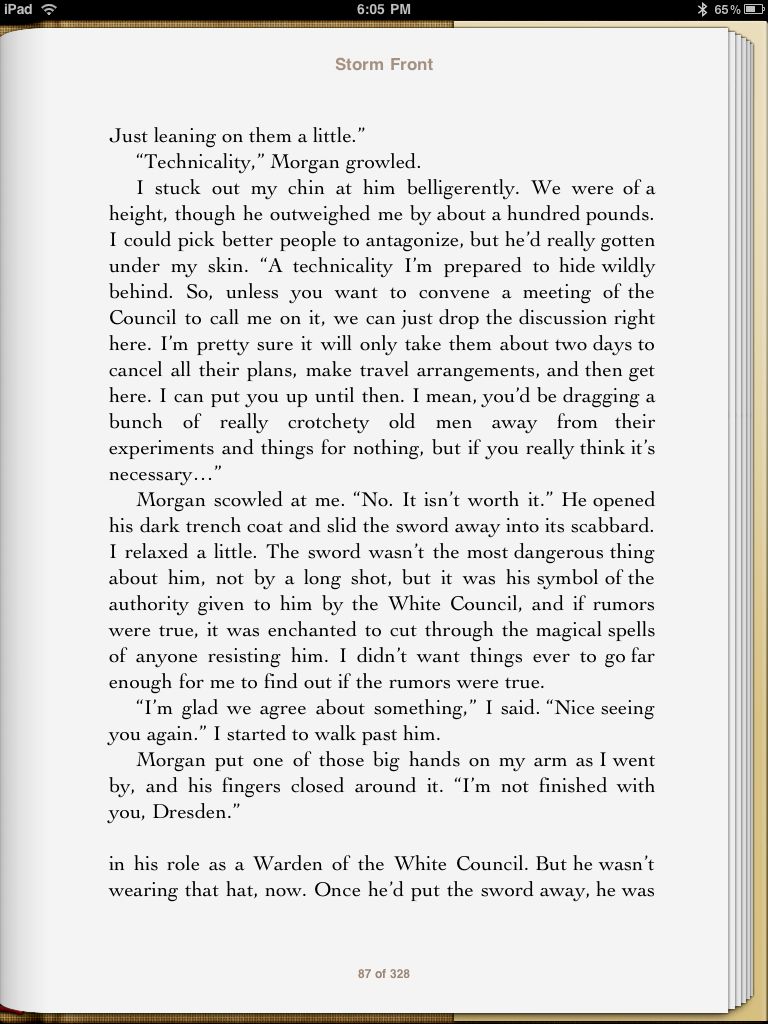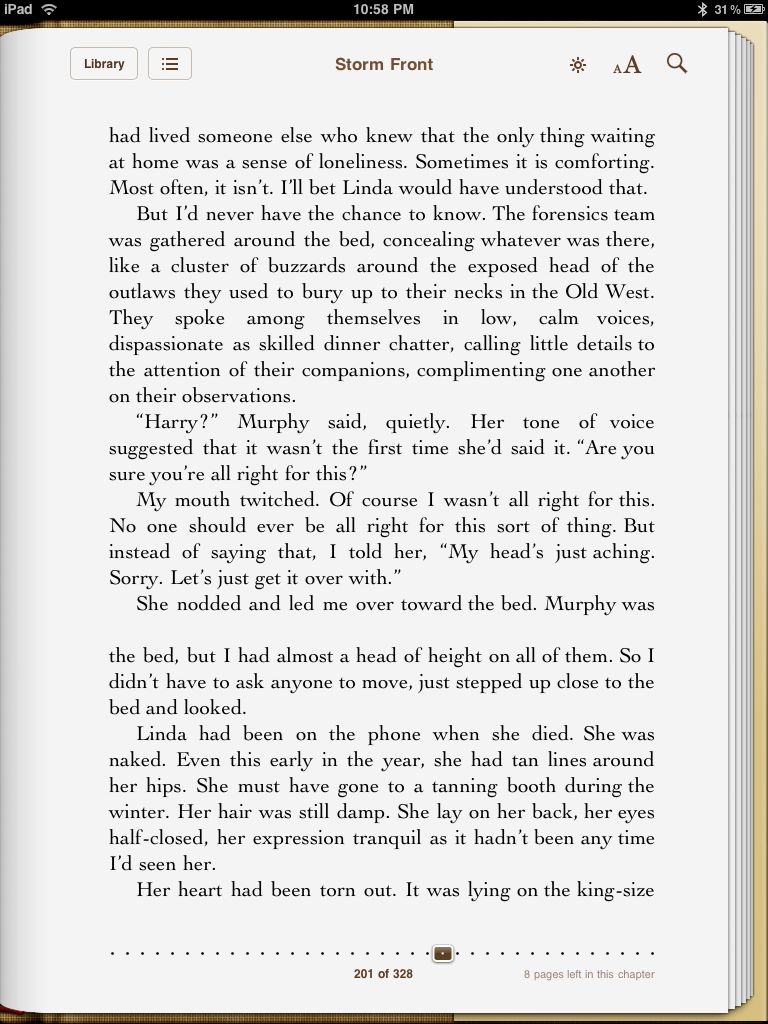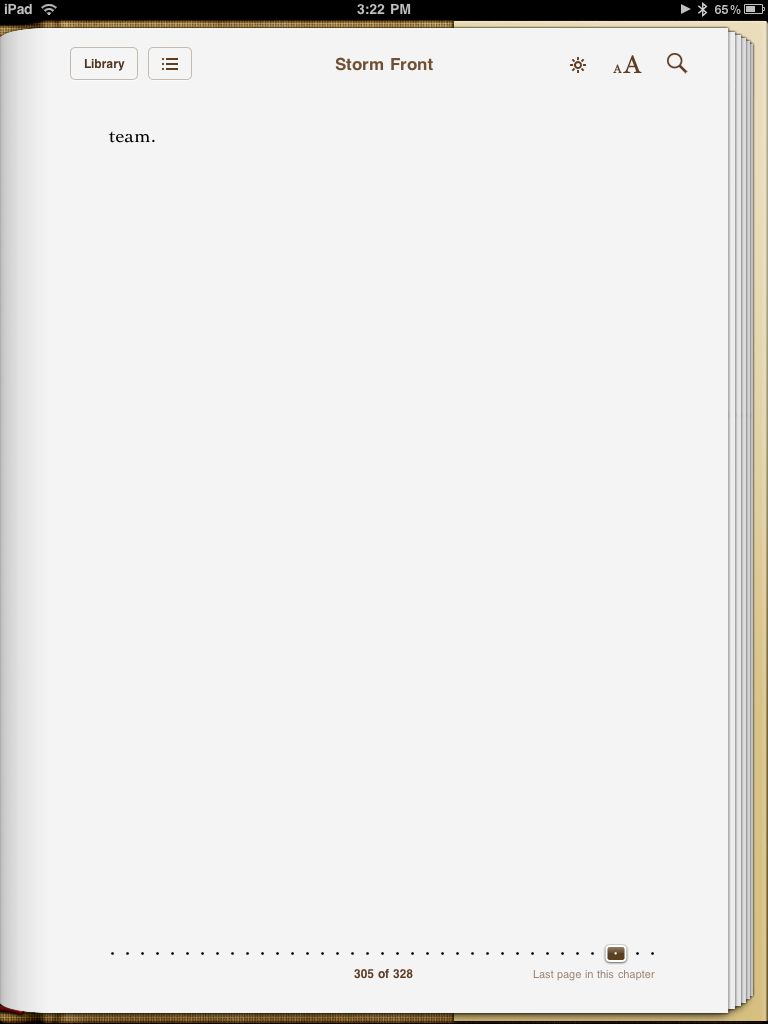 Many people in forums across the internet have been complaining about how pricey the ebooks in the iBooks store are. Don't they realize we are seeing the results of the Kindle/Publisher war that Amazon.com lost? Don't they remember? Amazon.com was the bad guy. The agency model now rules. Publishers can now set their own prices. Huzzah! Customers get to pay $12.99 for an electronic file that is only readable in iBooks—a file that can be corrupted during a brownout, or even deleted. Victory! People can't loan the ebook to friends. They can't resell it when they no longer want it. Viva la revolución!
Many people in forums across the internet have been complaining about how pricey the ebooks in the iBooks store are. Don't they realize we are seeing the results of the Kindle/Publisher war that Amazon.com lost? Don't they remember? Amazon.com was the bad guy. The agency model now rules. Publishers can now set their own prices. Huzzah! Customers get to pay $12.99 for an electronic file that is only readable in iBooks—a file that can be corrupted during a brownout, or even deleted. Victory! People can't loan the ebook to friends. They can't resell it when they no longer want it. Viva la revolución!I'm not a luddite. I've been enjoying digital music for so long some of my songs are MP2s. When iTunes Store opened, I was a steady customer. The price was just right. I could spend an hour trying to find a "free" version of a song, or a few minutes for a 99¢ one. It wasn't hard to decide how I should spend my time. Likewise, Kindle
Amazon.com truly miscalculated. Instead of playing hardball by stating terms and allowing the publishers to be the bad guys by letting them pull their product lines, Amazon.com took their ball and tried to go home. Outrage! Fans united. Authors bloviated and fumed. Editorials were written. Amazon.com's draconian solution to contract negotiation blew up in their faces.
 Now we're left with binary puffs of text priced $9.99 to $12.99. Many people have explained why this is a bad thing (Try Sharon Zardetto's excellent post on the subject). Raising prices in a downturn economy is bad, overcharging for 1s and 0s is bad, high prices depressing impulse buying is bad, etc. Sharon points out that more expensive books means she buys less. That's what I have found now with $1.29 music tracks on iTunes. I buy less. 99¢ was right at my impulse point. 30¢ more makes me think just long enough to decide to buy something else for 99¢ or not buy anything at all. 69¢ tracks are as rare as unicorns. In fact, variable pricing is such a pain that I buy less now than in years before. I'm not alone.
Now we're left with binary puffs of text priced $9.99 to $12.99. Many people have explained why this is a bad thing (Try Sharon Zardetto's excellent post on the subject). Raising prices in a downturn economy is bad, overcharging for 1s and 0s is bad, high prices depressing impulse buying is bad, etc. Sharon points out that more expensive books means she buys less. That's what I have found now with $1.29 music tracks on iTunes. I buy less. 99¢ was right at my impulse point. 30¢ more makes me think just long enough to decide to buy something else for 99¢ or not buy anything at all. 69¢ tracks are as rare as unicorns. In fact, variable pricing is such a pain that I buy less now than in years before. I'm not alone.Publishers believe that people should pay for convenience. They dismiss arguments of perceived value. The problem is that ebooks are often priced higher than paperbacks and that discrepancy in perceived value affects people such as myself. When you mix poor product quality with high prices, I am left scratching my head as I wonder how these guys think this is a good business model.
I bought two books through iBooks to test the experience. The first was Joseph Conrad's Heart of Darkness
With a paper book, I can pick it up, page through it, and feel its value. With ebooks, I have to trust the publisher to provide me a professional product. I can't actually page through it and see for myself. In the case of Storm Front, the free sample I downloaded first didn't include the pages with missing text. In the case of Heart of Darkness, I didn't find the extended material worth $8.99. Like in the Kindle, the included extra images were pitifully small and lores for such a gorgeous graphics device. For me, the trust has been broken.
 In my opinion, if publishers are going to charge trade paperback prices, I expect cover art I can admire (iBooks only shows cover art in thumbnail view), and professional typesetting. There is much I like about the iBooks app such as its classy layout, slick navigation features, bookmarking, and especially page numbers with real world meaning unlike the bizarre method the Kindle uses. However, if buying an ebook is a crap shoot, what good is convenience if the product is premium priced for disposable quality?
In my opinion, if publishers are going to charge trade paperback prices, I expect cover art I can admire (iBooks only shows cover art in thumbnail view), and professional typesetting. There is much I like about the iBooks app such as its classy layout, slick navigation features, bookmarking, and especially page numbers with real world meaning unlike the bizarre method the Kindle uses. However, if buying an ebook is a crap shoot, what good is convenience if the product is premium priced for disposable quality?Soon the reality of the Top 20 economy in the iBooks store will begin to impress itself upon the independent publishers. They'll grow tired of being squeezed out of premium placement while also competing against the entire free Project Gutenberg collection of classics. They'll start dropping their prices to compete with the big boys who pay for "Featured" status in order to stand a chance at making the Top 20. This process is well established on the iPhone app store and has begun to happen on the iPad app store.
It's not hard to imagine that the Top 20 will be filled with $.99 books one day soon, but will any of them be worth reading? I have no idea, but at that price I'd be willing to take a chance. At $9.99 I'll keep my wallet shut tight.
